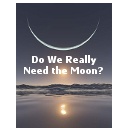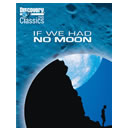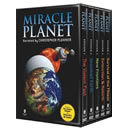Moon Mysteries
The Moon is our planet's closest neighbor. It's responsible for our tides, seasons, the stabilization of our axis, and the length of our days and nights. Without it, most life forms on Earth would likely not exist. But how much do we really know about this mysterious orb? After much scientific study, many questions still remain unanswered. The documentary Moon Mysteries, produced by the popular Naked Science series, seeks to fill in and explore these gaps in our understanding.
The film opens by taking us back 4.5 million to the time of the Moon's formation. The prevailing scientific consensus tells us that this event was precipitated by a violent collision with our planet. Over a long and deliberate course of time, the waves of debris produced by this impact began to coalesce and form what we know today as the Moon.
By unlocking additional details about the Moon's vast history, researchers hope they can also learn more about the evolution of our own planet, its earliest inhabitants and what fates may lie in wait for us all. In a series of thought-provoking interviews, several top figures in the world of science help us grapple with complex concepts.
There's Neil Comins, a Professor of Physics and Astronomy at the University of Maine, who outlines the Moon's influence on the Earth's tides billions of years ago. These tides - measuring thousands of feet in height and hundreds of miles in diameter - begat a mineral-rich "primordial soup" which birthed the earliest origins of life.
Then there's Dr. Guillermo Gonzalez, an Assistant Professor of Astronomy at Iowa State University. Studying lunar meteorites that have landed on Earth, he wonders if meteorites from our planet may in turn populate the Moon, and what secrets these might reveal about our species.
For every theory, there are many more questions in search of definitive answers. Can our observations of the Moon help us predict the occurrence of natural disasters such as earthquakes, tsunamis and volcanic eruptions? Why is the Moon slowly moving away from the Earth at a rate of 1.5 inches per year?
Festooned with gorgeous photography, informative animations and a wealth of invaluable insights, Moon Mysteries is a fascinating and enlightening viewing experience.




From the storyline: "The prevailing scientific consensus". That should tell you that it is hokum. Why didn't the impact debris that supposedly formed the moon, form a Saturn like debris ring or eventually fall back to earth since "gravity" calls for masses to attract?
Why put any credence to their hypothesis? Is the moon, really "the moon"?
If you can look along the coast through a telescope and see short enough things that should be "on the other side of the horizon". If you can watch different people use lasers across lakes wide or long enough for the Earth's supposed curvature to block the beam ...and it is easily seen at night... Then what does that say about what they are telling us the moon is?
There are scientists who believe, from their measurements, what we call the sun, to be a porthole through which "light" passes and NOT a big burning ball of gaseous matter.
If I support a large diameter mile long plastic pipe above ground, keeping all parts of the pipe at exactly the same height, it would seem a liquid in that pipe to make it half full would also be the same half full depth all along that length of pipe.
If I now lower the pipe to the ground, letting it bend to the supposed curvature of the Earth, in an ideal area that matches the average supposed curvature of the Earth, I am supposed to now magically believe that the liquid is not going to flow towards both ends of the pipe, seeking level, and the middle of the pipe have a depth of liquid that is less (about 8 inches less), by that amount of curvature?
Water seeks its level. It doesn't seek its curvature.
Is there anything the teachers teach, that teach the teachers, that is true? And why would they lie, if they even know they are ...because too lazy to look instead repeating propaganda?
WHY INDEED. Maybe you should investigate why, instead of believing all the nonsense so called scientists push on to you.
Accepting this Moon theory as fact, then it would have been impossible for life to have evolved on Mars without a massive satellite to stir its Primonial Soup, if it had any. If life had managed to evolve on Mars without a massive satellite, then it would have had nothing to protect it from the harsh bombardment from space.
Bram your right , tides yes but seasons ?
Funny how high the Moons content is so high in titainium and different % of elements in the rocks , not like Earth rock ?
Of course it isn't identical to Earth rock. The moon is made up of not only Earth rock but an alien body of unknown composition.
Does anyone know how a reflective plate got left on the lunar surface, since those Apollo fraudsters never actually went there?
We got stuff on Mars. Have we been there?
I enjoyed this documentary, it put to rest thought I had about the moon's role in every aspect of our lives.
A lot of wild science fiction and speculation presented as elusive simulated fact...
yes, really.... by keeping that slanted rotational axis stable the moon is indeed a major factor in our seasons. i'd say you could use a little more schooling yourself, bram.
"The moon is responsible for our seasons.."
Really? I think the editor needs to go back to school.
The slanted rotational axis of earth is what causes seasons.
At time 13:00 the impact that created the moon knocked Earth onto a 23.5 degree axis. And at time 13:50, it talks about how the moon acts like a gyro to maintain that 23.5 degree axis.
Great Doccie, (for eight to twelve-year-olds).
Nothing new and nothing 'mysterious' for anyone older.
"Nothing new....." What did you expect from a documentary that was made in 2006? Part of being a great documentary is being able to present complex theories and ideas in simple form so anyone can understand it. I think you are on the wrong site. Perhaps you need to find another site that is more suited to your supposed intellect and and educational level.